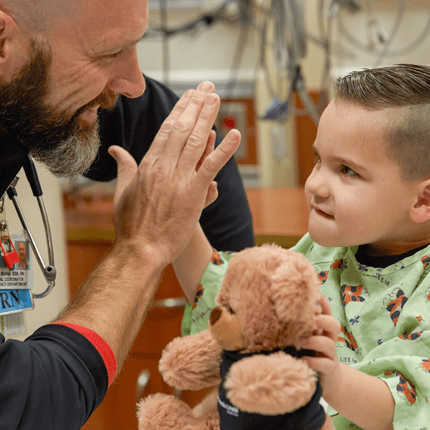

Seizures

What Are Seizures in Children?
- A seizure is a sudden, abnormal wave of electrical activity in the brain that can result in physical symptoms. Seizures begin suddenly. Most often stop on their own within a few minutes.
- People often associate seizures with dramatic symptoms, such as loss of consciousness or convulsions (uncontrolled shaking). Signs and symptoms vary depending on the type of seizure a person has and what part of the brain is involved. Some seizures are not obvious to others. Rather than physical symptoms, the child has an “odd feeling,” such as déjà vu (a sense of having experienced the present situation before). These odd feelings come “out of the blue.” They usually get worse as the person continues to have seizures.
- Seizures are treatable. Many children outgrow their tendency to have them. An accurate diagnosis can help doctors find the most effective treatment.
- When a child has shown a tendency to have recurrent seizures, it is called epilepsy.
What are the signs and symptoms of seizures in children?
- Unfortunately, it is not always easy to recognize a seizure since not all seizures include convulsions or unusual muscle movements. But over time, if your child keeps having them, untreated seizures can be dangerous and get in the way of a child's cognitive growth and education which is why it is important for parents, teachers and other adults to recognize seizure manifestation in infants and children.
- Non-motor Symptoms
- A color change of the lips or face
- A funny feeling the child can't describe
- Lack of awareness and/or decreased responsiveness sometimes with “staring off”
- Eyes or head turned to one direction for a period of time
- Staring with eye fluttering
- Seeing stars or shapes, smelling something “funny”, having a queasy or uneasy feeling in the belly (can be an aura) before the actual event begins
- Loss of bowel or bladder control that is of sudden onset after a child has been potty trained for a while.
- Motor Symptoms
- "Automatisms," or repetitive activities, such as fiddling with clothing, grunting, lip-smacking and clumsy movements
- Convulsions (uncontrolled shaking of the body)
- Drooping facial features or jerking of one half of the face
- Jerking movements or stiffening of one or more arms and legs
- Sudden loss of muscle control
- When the seizure is over, the child may be tired and need to rest. She or he may also complain or body aches.
Types of Seizures in Children
There are many different types of seizures in children.
- Febrile seizures
- Myoclonic seizures
- Absence seizures
- Generalized seizures
- Tonic seizures

Diagnosing Seizures in Children
If your child experiences a seizure, they should be seen by a pediatric neurologist or pediatric epileptologist (a pediatric neurologist specializing in epilepsy). During your child's first appointment, the doctor will ask questions about your child's seizure history and health history and whether other people in your family have had seizures. Please feel free to bring in recordings of what you think could be a seizure as they can be very helpful to the doctor. The doctor will also do a thorough examination and may order tests, such as:
- Electroencephalogram (EEG)
- Magnetic resonance imaging (MRI) of the brain
The goal is to confirm the diagnosis, discover the underlying cause of the seizure(s) and provide treatment.
Team
Pediatric specialists including epileptologists and neurosurgeons on the medical staff at the Children's Hospital of Michigan have treated patients with these conditions referred from within and outside the country.
Our epilepsy nurse coordinator
serves as a single point of contact for families and patients navigating their specialty appointments, provides comprehensive patient education, provides support and ensures continuity of care.
Treatment
There are several seizure medications that are available in the United States. Your doctor will review what options are best suited for your child. He /she will discuss common side effects and potential duration of treatment. If your child is still having
seizures or significant side effects after medication use, your doctor may refer them to an epileptologist (a neurologist who specializes in epilepsy) to confirm diagnosis, review current treatment regimen, and discuss other treatment options, including
surgery.
Children’s Hospital of Michigan has the capability to perform overnight EEGs and long term EEGs that are monitored by trained technologists.
A great resource for those with children experiencing seizures or who
have been diagnosed with epilepsy is the Epilepsy Foundation of Michigan.
Living with Seizures
Most children who have seizures go on to live full lives. Seizures are not necessarily a lifelong condition. Many children outgrow their tendency to have seizures. And for those who do not, treatment is often effective.
If your child had a seizure, talk to the doctor about:
- any medicines your child should take
- any “triggers” (such as fever, flashing lights, , lack of sleep, or medicines) that can make a seizure more likely
- any precautions your child should take while swimming, bathing, driving and working.
- whether your child should wear a medical ID bracelet
- whether your child needs to see a neurologist


